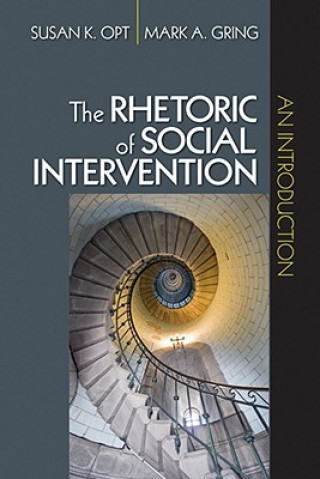
Code: 04786719
Rhetoric of Social Intervention
by Susan K. Opt, Mark Gring
This is the first-ever thorough exploration and discussion of the rhetorical model of social invention [RSI] (initially conceived by rhetorical theorist William R. Brown) for today's students and scholars. This unique communicatio ... more
- Language:
 English
English - Binding: Hardback
- Number of pages: 280
Publisher: SAGE Publications Inc, 2008
- More about this

You might also like
-

Increment
19.93 € -18 % -

Twentieth Century Literary Criticism
688.87 € -

Encyclopedia of Martial Arts Movies
137.25 € -

Spiritsong Tarot
19.53 € -23 % -

Royals. ?Como Sobrevivir a la Realeza?
17.28 € -4 %
Give this book as a present today
- Order book and choose Gift Order.
- We will send you book gift voucher at once. You can give it out to anyone.
- Book will be send to donee, nothing more to care about.
More about Rhetoric of Social Intervention
You get 545 loyalty points
 Book synopsis
Book synopsis
This is the first-ever thorough exploration and discussion of the rhetorical model of social invention [RSI] (initially conceived by rhetorical theorist William R. Brown) for today's students and scholars. This unique communication-based model provides students with a systemic framework for interpreting, analyzing, and critiquing social and cultural change from a rhetorical perspective. It offers students an easily accessible tool for critically reflecting upon the ongoing process of rhetorical intervention in people's perceptions of needs, relationships, and worldview.The model also gives students a methodology for considering social and cultural side effects of rhetorical interventions. This book offers an overview, explanation, and application examples of the RSI model that are unavailable elsewhere, ties into the trend of emphasizing a critical approach, and contributes to the turn toward a rhetoric of activism. The RSI model is based on the assumption that naming, or the human ability to transform both sensed and non-sensed experience into symbols, is the fundamental human activity.The RSI model assumes that we have an inherent need to name for in naming experience, we make sense of and give meaning to that experience. For example, immediately after two planes hit the World Trade Center towers, a national discussion launched on how to name that experience: Terrorism? Revenge? Accident? Desperation? How experience is named influences our perceptions of needs and relationships, so the model assumes. The model lays out the communicative process by which change occurs - in three sub-cycles called need, power, and attention - viewed as dimensions of ideology.
 Book details
Book details
Book category Books in English Reference, information & interdisciplinary subjects Interdisciplinary studies Semiotics / semiology
220.10 €
- Full title: Rhetoric of Social Intervention
- Subtitle: An Introduction
- Author: Susan K. Opt, Mark Gring
- Language:
 English
English - Binding: Hardback
- Number of pages: 280
- EAN: 9781412956895
- ISBN: 1412956897
- ID: 04786719
- Publisher: SAGE Publications Inc
- Weight: 480 g
- Dimensions: 228 × 152 × 18 mm
- Date of publishing: 09. September 2008
Trending among others
-

Elements of Semiology
16.87 € -8 % -

Course in General Linguistics
27.81 € -6 % -

Theory of Semiotics
40.80 € -

This Means This, This Means That Second Edition
41.21 € -

Visual Language of Comics
41.52 € -7 % -

Signs, Symbols and Ciphers
8.38 € -28 % -

Who Understands Comics?
40.19 € -

Representation
54 € -

Semiotics of Emoji
27.20 € -4 % -

Media Semiotics
28.63 € -

Reading Images
56.65 € -

Lyotard, Literature and the Trauma of the differend
62.28 € -

Understanding Media Semiotics
44.79 € -4 % -

I Saw Her That Night
15.64 € -10 % -

And
14.92 € -23 % -

Rhetorical Argumentation
82.53 € -10 % -

Semiotics of Happiness
65.14 € -

Semiotics Continues to Astonish
298.35 € -

Semiotics of Culture and Language
233.50 € -

Decoding International Law
171.42 € -

Tropics of Teaching
59.52 € -

Symbolic Forms and Cultural Studies
52.97 € -

Music as Multimodal Discourse
60.34 € -

Undoing Aesthetics
77.93 € -

Iconicity and Abduction
62.28 € -

Icons of Power
203.33 € -

Understanding Media Semiotics
215.19 € -

Reading Images
199.95 € -

Conscience, Consensus, & Crossroads in Law
78.65 € -

Private Speech
199.95 € -

Semiotics of Animals in Culture
110.15 € -2 % -

Consciousness and the Philosophy of Signs
111.79 € -

Readings in Zoosemiotics
38.14 € -19 % -

Multimodal Semiotics
282.29 € -

Modality and Propositional Attitudes
46.53 € -

Framing Public Life
89.08 € -

When Ego Was Imago
247.62 € -

Aesthetic Tension
74.35 € -

Visual Rhetoric
202.20 € -

Signs in Use
199.95 € -

Perspectives on Audiovisual Translation
79.46 € -

Key Terms in Systemic Functional Linguistics
166.41 € -

Critical Global Semiotics
192.18 € -

Peirce's Twenty-Eight Classes of Signs and the Philosophy of Representation
215.19 € -

Rhetorical Argumentation
220.10 € -

Framing Public Life
259.28 € -

Human Communication Theory and Research
192.18 € -

Human Communication Theory and Research
113.73 € -

Icons of Power
80.08 €
Collection points Bratislava a 2642 dalších
Copyright ©2008-24 najlacnejsie-knihy.sk All rights reservedPrivacyCookies



 15549 collection points
15549 collection points Delivery 2.99 €
Delivery 2.99 € 02/210 210 99 (8-15.30h)
02/210 210 99 (8-15.30h)